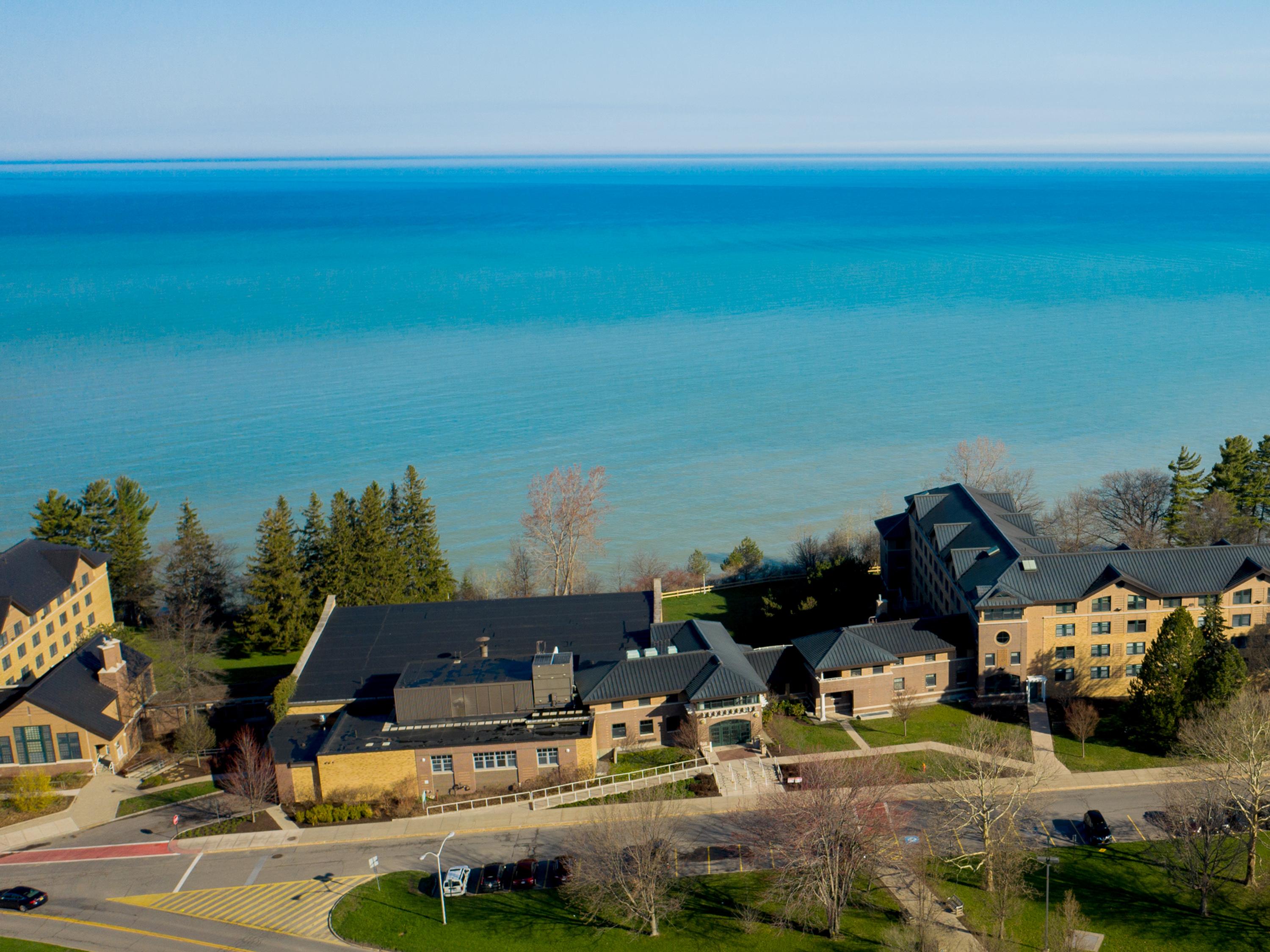Freshwater focus -- SUNY Oswego, the only New York college campus on Lake Ontario, continues its focus on the Fresh Water For All Grand Challenge. Five Grand Challenges mini grants will fund projects related to this campuswide initiative.
Five Grand Challenges mini grants for fall will support SUNY Oswego’s outreach to local businesses, an art exhibition, a musical performance, an anthology of student work and creation of a water-driven musical instrument, all in support of the college’s inaugural campuswide Fresh Water for All Grand Challenge.
“An important part of this initiative brings fresh water topics and activities into the classroom or into student projects,” said Scott Furlong, the college’s provost and vice president for academic affairs. “The mini grants are intended to support this initiative. This year’s mini grants include faculty involvement and courses across three schools as well as several multi-disciplinary collaborations, applied learning and civic engagement activities.”
In a project that joins two priorities of the college’s strategic plan -- Grand Challenges plus Communities and Partnerships -- a project led by Catherine Sullivan from the accounting, finance and law faculty will have students in small groups reaching out to local businesses that, without taking steps, could have significant negative impacts on local freshwater. Local partners will include medium to large entities such as manufacturers, businesses, hospitals, schools and others.
Sullivan piloted the project with students in the spring and hopes “the grant money will incentivize more students to reach out to businesses in our county or a contiguous county and not worry about personally covering the expense,” she said.
“The student will travel to the site and hopefully have a tour of the operation so that they can appreciate the impact/potential impact of the business on freshwater supply,” Sullivan explained. “Then, the student will interview the business owner/manager as to what laws regulate their business insofar as impacting freshwater supply, how they comply with the laws, how burdensome compliance is, impacts on profits and the owner's/managers' feeling on regulation of business for the benefit of society as a whole in protecting our freshwater supply. Then the student will write a paper summarizing their experience including the information contained in the tour and interview.”
For students, the project can help build skills relative to their future plans as well as gain knowledge on the freshwater issues. Gathering and sharing information can both bring the community into the conversation and provide beneficial data collection for the Grand Challenges project.
“I thought we could incorporate some basic legal principles into a paper using the information received from interviewing a local business that would have an impact on the availability and quality of our freshwater,” Sullivan said. She aims to have students discuss some of the concepts they are learning in class while practicing networking and business social skills.
The other projects funded under the mini grant include:
-
Led by Michael Flanagan of Tyler Art Gallery, an initiative will bring an exhibition by Marie Lorenz, a contemporary visual artist from New York whose artwork is described as “nautical” and whose main themes and images involve bodies of water often overlooked (and thus often abused). Lorenz collects cast-off human products, re-casts them, prints them, incorporates them in sculpture and causes the viewer to respond to the previously invisible. Her multimedia public exhibition, which has traveled the globe, will come to Oswego in the fall semester.
-
A partnership of Artswego, English and creative writing, music and Native American studies will bring ETHEL (known as New York City’s most adventurous string quartet) and Robert Mirabal, a Native American musician, instrument builder and three-time Grammy Award winner, to present a cross-cultural concert experience in fall. According to the application led by Artswego’s Miranda Traudt, the project will embrace “Water as the embodiment of Spirit, and its essential role in Life on Earth.” The audience will be immersed in a flow of music, narrative and ritual that evokes timeless Native American traditions through contemporary musical artistry. The program will showcase instrumental virtuosity, song and storytelling to evoke the magic and majesty of the water and spirit that connects all life. In addition to the public concert, Mirabal will also present his poetry as a guest artist in the English and creative writing department’s Living Writers Series and provide a guest lecture for students in the Native American studies program. ETHEL will present a workshop and demonstration with students in the music department.
-
Melissa Webb of the English and creative writing faculty will lead the juried collection, distribution and presentation of student cross-disciplinary work on the Grand Challenge project through a printed anthology of exemplary student production over the fall 2019 and spring 2020 semesters.
-
Paul Leary’s electronic music course will create a wooden mechanical music box powered by flowing water using a classic water wheel to drive the mechanical motion. The class will then use sensors to send data about speed and other data points to computers that will play music and samples. The sounds created by the water music box will come from various collections of recordings of water in its natural environment around the local area that students will obtain through field recordings.
The campus community is invited to apply for mini grants if they have plans for a spring 2020 project; application deadline is Nov. 11. For more information, visit the Grand Challenges website.




